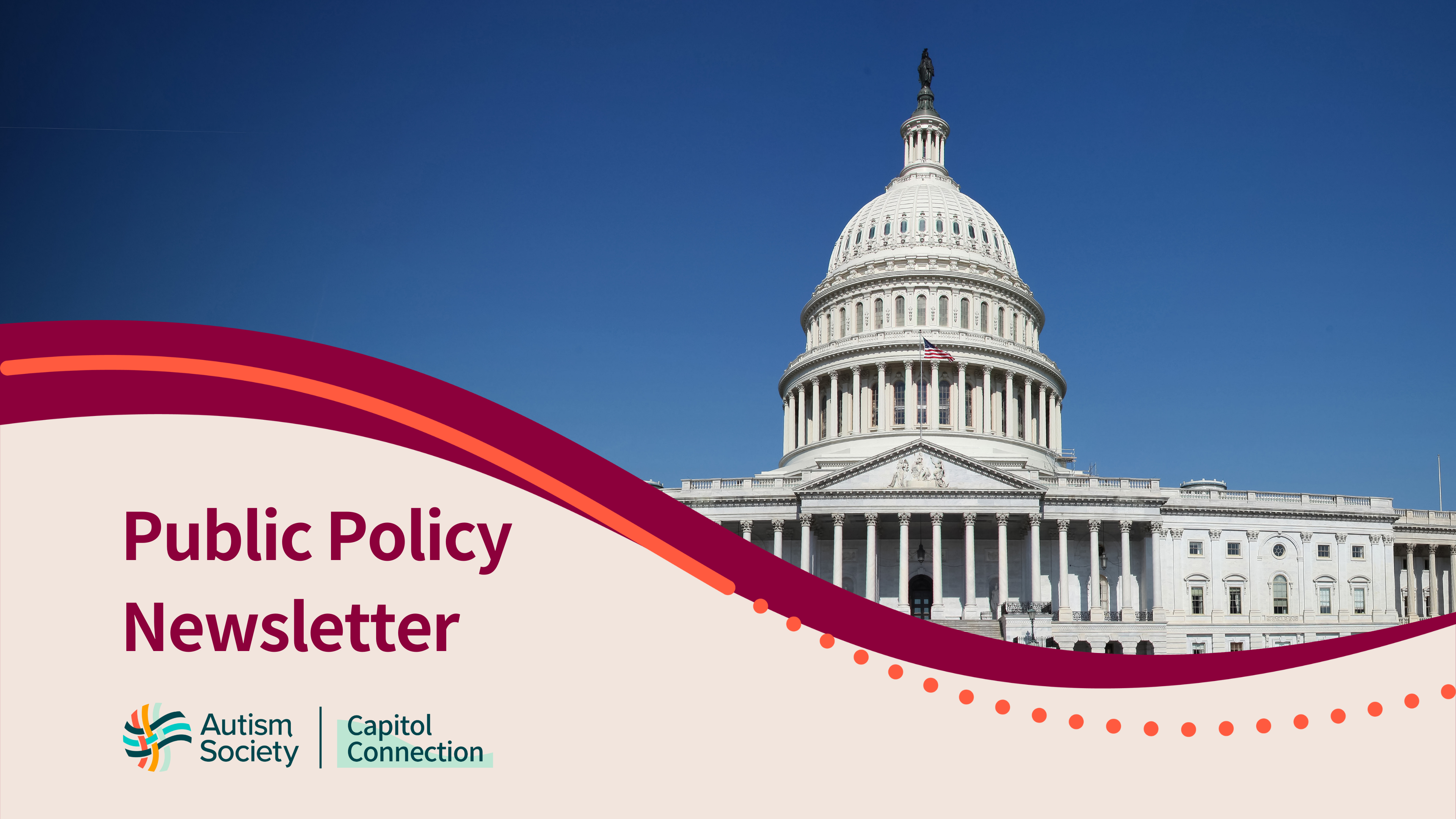
In this issue of Capitol Connection, find updates on legislative action as Congress works for three more weeks before August recess. Take action to educate Members of Congress about:
Please continue to use the Autism Society’s online Action Center for voting information, links to legislation we monitor, and sample letters to use to educate Members of Congress.
Legislative Update
Congress returned from the July recess with a busy agenda and very few legislative days before heading out in the Fall to prepare for the November 8 mid-term elections. This is an important time to educate Members about some of the legislative priorities that have a chance for passage. The first three articles below on electric shocks, IDEA funding and Medicaid HCBS have links to take action. Find all of our current action alerts on the online interactive action center.
Electric Shock Ban
Legislation is moving through Congress that could stop the inhumane use of electric shock devices on people with Autism and other developmental disabilities. The only institution that uses such devices is the Massachusetts Judge Rotenberg Center (JRC).
The FDA finalized a ban on such devices in 2020. However, the rule was overturned on a technicality regarding statutory authority. Now, Congress is working on legislation related to the Food and Drug Administration that includes a provision that bans the use of electrical stimulation devices (H.R. 7667/S. 4348). The next step is for the House and Senate to resolve the differences between their two bills. We need your help to urge Congress to pass the FDA bills with the ban on electric shock devices.
The Autism Society signed on to a letter in support of the provision to ban its use. Please use the Action Center Alert to urge Members of Congress to pass the FDA bill with the ban on electronic shock devices.
Full Funding for IDEA
The Autism Society of America joins the Coalition for Full Funding for IDEA this week in a campaign to urge Congress to pass the Individuals with Disabilities Education Act (IDEA) Full Act (HR 5984/ S 3213), a bill that provides a glide path to fully fund IDEA over ten years.
States are struggling to meet the needs of students with disabilities, especially as students return to school following online learning. The Individuals with Disabilities Education Act (IDEA) authorizes funding for forty percent of the additional cost States pay associated with special education, but Congress has not kept up this promise. In fiscal year 2022, only 13 percent was provided to help states pay for special education costs. The IDEA Full Funding Act would help states provide the education and related services students need and deserve.
Please use the action alert and sample letter prepared by the Autism Society to help educate Members of Congres about the importance of fully funding this important civil right to a free and appropriate public education. Use this document prepared by the Coalition to see your state’s shortfall in meeting the needs of students. See more talking points here.
Home and Community-Based Services
After months of standstill, Congressional leadership is working toward final negotiations on an economic relief package using budget reconciliation. Former negotiations included funding for home and community-based services (HCBS) but it is unknown what will all be included in this set of negotiations. Therefore, we must continue to educate Senators about the urgent need for these funds. This funding is critical for reducing the waiting list for services and for providing better pay for direct care workers. Please urge your Members of Congress to include funding for programs that support people with Autism to live, work and recreate in the community.
Mental Health
On Monday, President Biden held a White House ceremony celebrating the passage of the Bipartisan Safer Communities Act. This law represents the first gun control measure to pass in decades that makes it harder for individuals to obtain guns illegally, adds protections for domestic violence victims, and strengthens background checks. While the focus of the law is to reduce gun violence, the new law also provides a massive investment in existing mental health programs and school safety programs. According to the Congressional Budget Office, the new law includes $1 billion over five years for two programs to boost the number of mental health counselors in schools and $28 million for school-based trauma support. Other mental health provisions include the following:
- $80 million over four years for a pediatric mental health care access program, which allows pediatricians to provide mental health services via telehealth. An additional $60 million over four years is directed toward training primary care clinicians to provide mental health services to young people.
- $250 million over four years to increase the Community Mental Health Services block grants to states to help fill in blanks in a state’s mental health system, such as creating care programs for adults and children with serious mental illnesses or emotional disturbances.
$240 million over four years would be added to Project AWARE, which provides grants to mental and behavioral health organizations, community groups, and schools to raise students’ awareness of and connect them to mental health services in schools. - Helps states to implement, enhance, and expand school-based health programs under Medicaid through updated guidance, technical assistance, and state planning grants.
- $150 million this year for the new 988 National Suicide Prevention Lifeline, which launches in mid-July.
While the Autism Society welcomes the much-needed investment in mental health programs and services, the organization joined 60 other national organizations in condemning lawmakers associating gun violence with mental health disabilities. The two issues should not have been joined.
International Protections Act
Senator Robert Menendez, Chairman of the Senate Foreign Relations Committee, plans to introduce the “International Children with Disabilities Protection Act of 2022” which would establish a grant-making fund within the U.S. Department of State to assist countries abroad in developing policies and social supports to protect families and ensure full inclusion of children with disabilities. The legislation will create programs to train policymakers, activists, and other individuals on successful models of reform, services, and rights protection; this ensures that children with disabilities can live and grow up with their families and become full participants in society. The Autism Society signed on to a letter of support for this bill that will be posted soon.
FY 2023 Appropriations
The House Appropriations Committee approved its fiscal year 2022 Labor, Health and Human Services, Education, and Related Agencies (L-HHS-ED) funding bill on June 30. The House bill provides increases for many of the programs that support individuals with Autism and their families. Some of the notable increases are for the Lifespan Respite Care Act, which almost doubles the funding from $8 million to $14 million. Autism CARES Act funding for interdisciplinary health professionals is increased by $3 million to $57 million. IDEA Personnel Preparation would receive a 163 percent increase to $250 million to address the severe shortage of special education teachers. Vocational Rehabilitation Demonstration programs that assist people with disabilities to get jobs also receive a significant increase (172 percent) in the House bill. See other highlighted disability program funding in The Arc’s funding table. The House returns this week and will strategize about how to complete all 12 annual funding bills before the August recess.
Reproductive Health and Privacy
The Consortium for Constituents with Disabilities (CCD) Chair and Vice-Chair released a statement on the Supreme Court Dobbs decision overturning Roe v Wade acknowledging its impact on people with disabilities. The statement includes responses and additional resources from CCD member organizations regarding the decision.
Education
504 Request for Comments
The United States Department of Education requested comments regarding changes to regulations guiding Section 504 of the Rehabilitation Act, a foundational civil rights law. The Consortium for Constituents with Disabilities (CCD) Education and Civil Rights Task Forces sent a joint letter highlighting the need to update terminology, better clarify and collect data for students being served under 504, and strengthen protections under the law so that students are provided free and appropriate education under the law in alignment with IDEA (see related article). The letter, signed by 36 CCD members, was sent in response to the Education Department’s Office for Civil Rights’ request in May for comments in preparation for a formal update to Section 504 regulations. The next step is for the department to issue a formal notice of proposed rulemaking, expected in May 2023, which would then be open for public comment. Final rules are not expected until 2024.
State Implementation of IDEA Reviews
The U.S. Department of Education released their 2022 determinations, or reviews of how states and territories have implemented and met the requirements of the Individuals With Disabilities Education Act (IDEA). The Department bases these determinations on the State Performance Plan and Annual Performance Report. This year, 22 states met requirements, three states need assistance (one year), 35 states need assistance, and no state or territory received a determination of needs for substantial intervention. Under Part C, early intervention, 30 states met requirements, nine states need assistance, 17 states need assistance (two or more consecutive years), and no state or territory received a determination of needs for substantial intervention.
Find where the Department ranks your state and your state’s performance plan and report here.
Early Intervention Policy Recommendations
A new report was released by the ZERO TO THREE National Infant-Toddler Court Program entitled Strengthening Families with Infants and Toddlers: A Policy Framework for States. This framework focuses on advocating for states’ and local communities’ strength to support families with young children before times of crisis. The framework provides 11 policy recommendations with examples of successful programs from states including North Carolina, New Jersey, Illinois, Colorado, and Pennsylvania.
State Advocacy
New Education Recovery Strategies
The Biden Administration recently announced new innovative strategies to help support academic and social-emotional recovery for students using the American Rescue Plan (ARP) funds. The Department of Education is launching a partnership entitled the National Partnership for Student Success with non-profit organizations, school districts, and higher education to recruit 250,000 new tutors and mentors for students across the country. The network will encourage volunteers, employers, civil services, and other organizations to work together to help students succeed academically. In addition to the tutor and mentor network, the Administration will expand the Department of Education’s ability to share how school districts are successfully using ARP funding to help students through the Best Practices Clearinghouse. Lastly, the Department shared a map that includes school districts and states’ plans for using ARP funds to increase transparency for families. These strategies may be helpful to state education advocates.
PA: Additional Year of School for 21-year-olds
In Pennsylvania, Governor Wolf signed a bill (HB 1642) into law that will offer an additional public school year for those who turned 21 by the end of this summer, summer 2022. A formal notice will be provided to those eligible within the next week and then have until August 1st to state their choice. This was made possible by an advocacy campaign (Fix66) started by two parents concerned about their children’s lost education services related to the pandemic. They estimate that at least 600 to 800 of Pennsylvania’s most vulnerable youths will benefit from the extra year. The campaign will continue into next year.
Disability Stakeholder Calls
The Biden Administration’s Office of Public Engagement is holding weekly disability stakeholder calls in the month of July. These calls feature updates from cabinet officials to discuss the work they are doing toward disability equity. To register for these public weekly calls, register here. Dates: July 14, July 2, and July 28 at 2 pm ET.
Share:





